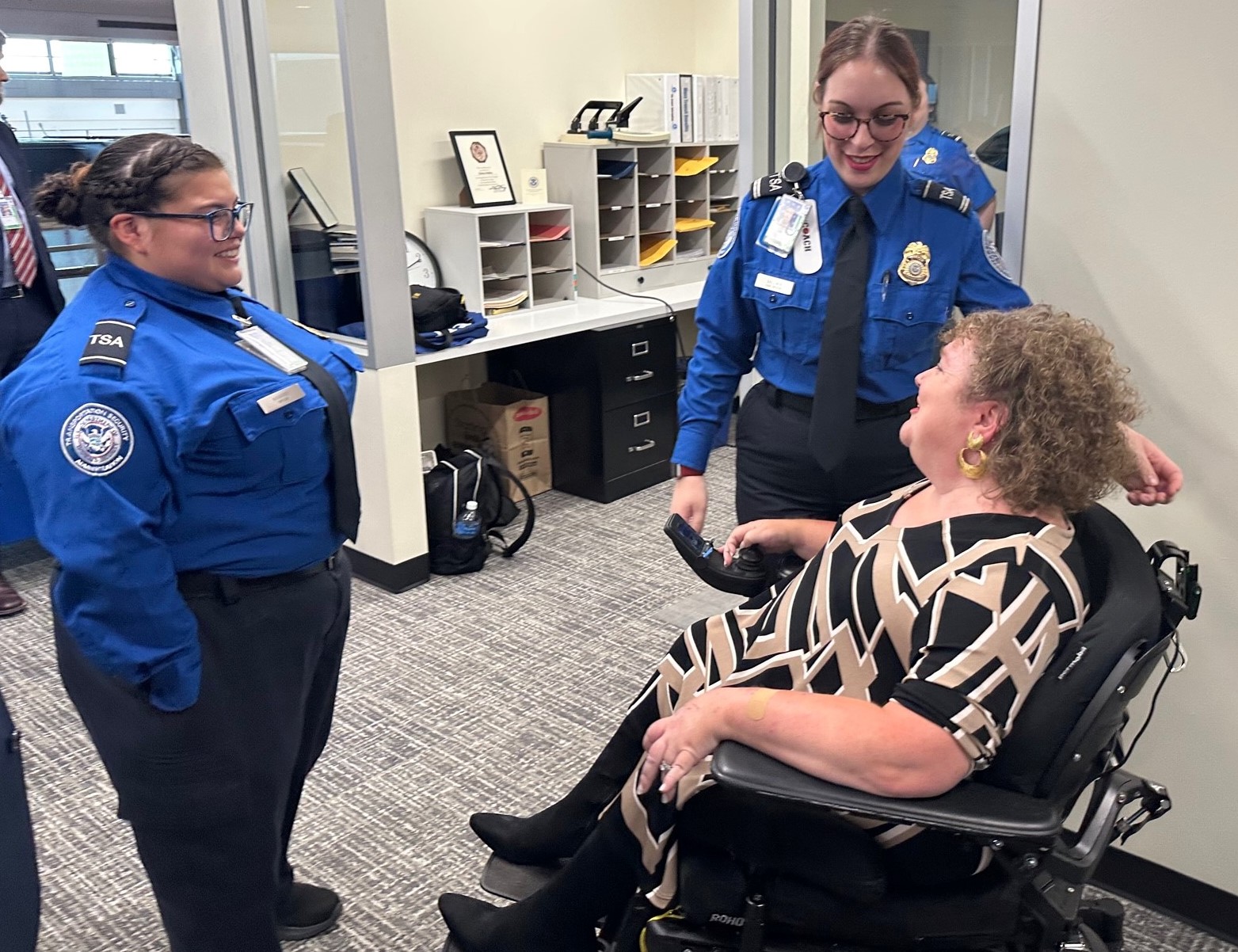 Executive Director for Traveler Engagement Jose Bonilla, Austin-Bergstrom International Airport TSO Idalis Navarros, Mindy Henderson, AUS LTSO Rebecca Baldwin and AUS FSD Gilbert Almaraz. (Photo by Ignacio Reyes)
Executive Director for Traveler Engagement Jose Bonilla, Austin-Bergstrom International Airport TSO Idalis Navarros, Mindy Henderson, AUS LTSO Rebecca Baldwin and AUS FSD Gilbert Almaraz. (Photo by Ignacio Reyes)
When Mindy Henderson has a good customer service experience, she goes straight to the top to say so.
Henderson, the editor-in-chief of the Muscular Dystrophy Association’s (MDA) Quest Media and a disability rights advocate, is an infrequent business traveler as a wheelchair user living with a neuromuscular disease. But after a recent positive travel experience, Henderson called Administrator Pekoske to share her excellent customer service encounter processing through security screening at Austin-Bergstrom International Airport (AUS) in Texas.
As Henderson approached the checkpoint in her wheelchair, she anticipated what has traditionally been a long wait on the public side of the Americans with Disabilities Act (ADA) gate. However, a checkpoint supervisor saw her outside the gate and engaged her, telling her that it would be a minute before an officer could bring her through the gate for a pat down.
“That verbal acknowledgement made all the difference, and I didn’t mind waiting at the ADA gate,” said Henderson.
The comment card Henderson filled out at the end of her experience gave a shout out to Lead TSA Officer Rebecca Baldwin and TSA Officer Idalis Navarros whose efficiency, professionalism and courtesy won her over.
At ADM Pekoske’s invitation, Henderson made a special trip to AUS to present Baldwin and Navarros TSA challenge coins to acknowledge the great service.
“The whole experience with Mindy was an inspiring and eye-opening moment,” said Navarros. “Not only did we make her feel comfortable and human, we as officers got to understand what she goes through daily and how we can help change the experiences of others going forward.”
MDA, the leader in neuromuscular disease research, care and advocacy, continues to raise awareness for impactful change with its Accessible Air Travel campaign. The goal is to improve access for people living with disabilities traveling by plane.

Baldwin was quick to point out that awareness is at the forefront of the Passenger Support and TSA Cares programs designed to help travelers with disabilities and medical conditions and others who may need additional assistance with screening.
"The Passenger Support Specialists program is important because it reminds officers to focus on the passengers and their needs," explained Baldwin. “In order to become the best officers, they must adapt and evolve with the passenger’s needs. The best thing to remember is passengers are people just like us."
Henderson’s AUS experience was noteworthy, not only because of the courtesy and professionalism she encountered, but because she went out of her way to say so. Baldwin and Navarros were rightfully acknowledged for their compassionate customer service because Henderson drew attention to the positive way she was treated.
Every day TSA officers provide exemplary care to passengers and their property every day, yet these actions often go unnoticed.
Now TSA has empirical data providing great customer service happens at checkpoints across the country. In a recent Passenger Experience Survey (PES) administered in the spring, the overwhelmingly positive results bear out that care for one another and passengers are a best practice at TSA’s public-facing checkpoints.

The survey was administered partly in response to Executive Order 14058 – Transforming Federal Customer Experience and Service Delivery to Rebuild Trust in Government. Insights gained from the results of the PES will be used to design, implement and improve all customer experience activities for the agency.
MDA recently announced a collaboration with TSA to improve the passenger experience. Read more here.
“The survey results demonstrate the public recognizes and appreciates TSA’s commitment to customer experience,” said Customer Service Branch Manager Niki French, who led the design and execution of the survey. “While the results of this year’s survey were consistent with previous surveys, our largest increase was around communication of screening procedures, which has been a big focus of our customer service training for the screening workforce and what Ms. Henderson found most impactful.”
By Karen Robicheaux, TSA Strategic Communications and Public Affairs
